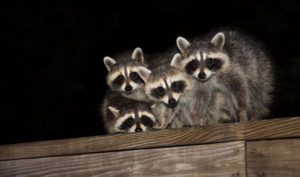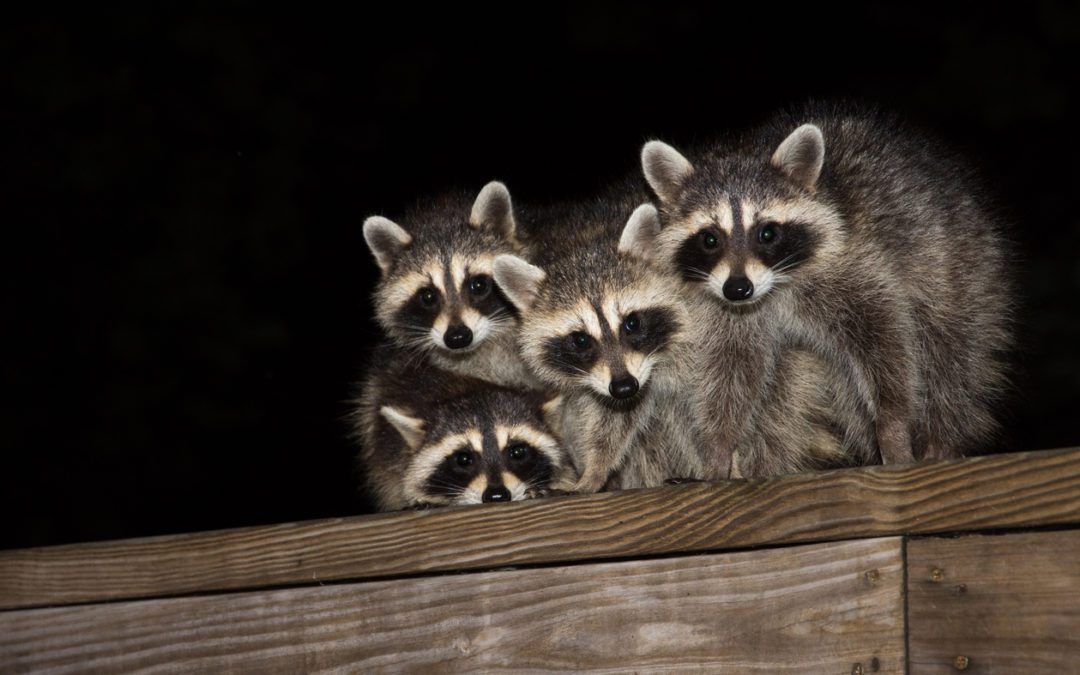When there are raccoons living in your attic, it may be tempting to go up to evaluate the situation by yourself. It’s natural to want to investigate what is happening in your own home, but if you’re hearing thumping, scuffling, or squeaking coming from the ceiling, it is best to call someone who handles wildlife professionally. A raccoon den site can be host to a wide array of health hazards from the parasites in their nesting material to the viral and bacterial strains living in their feces. They also pose a fierce physical threat when defending their territory, and are able to cause severe bodily harm. What follows are just a few instances of raccoon health hazards.
Rabies
If a raccoon believes its home is in danger, it will react with aggression. Raccoons are one of the top carriers of rabies in Illinois, and being bitten by one can prove fatal. Rabies is a virus that is carried in and transmitted through blood and brain matter, and it can affect both animals and humans alike. It attacks the central nervous system, damaging the brain. At first, a sufferer may experience fever, weakness, or headache, but advanced cases can cause trouble swallowing, an excess of saliva, anxiety, insomnia, and hallucinations. Once these kinds of symptoms develop, rabies is 100% fatal. If you’ve been bitten by a wild animal, it is imperative that the animal be captured and submitted for rabies testing so you can determine whether or not you need to be treated for the disease.
Raccoon Roundworm
This parasite has no negative effect on raccoons, but can be very dangerous to humans and certain animals. The worm lives in the raccoon’s intestines
Leptospirosis
Leptospirosis is a bacterial infection that is usually carried in a raccoon’s urine, but it can be spread through other bodily fluids as well. Humans can contract it through ingestion or by handling contaminated material and then touching their eyes, nose, or mouth. Typically, leptospirosis causes fever, chills, diarrhea, and vomiting, but if it’s left untreated, it can lead to kidney or liver failure as well as meningitis. In household pets, leptospirosis is often fatal.
Fleas, Ticks, Lice, and Mites
Like many species of invasive wildlife, raccoons are prone to carry a variety of parasites that depend upon warm-blooded animals for survival. These parasites can not only multiply (just 10 fleas can multiply to over 250,000 fleas in as few as 30 days) and spread throughout your home in search of a new host, but they are responsible for the transmittal of dangerous diseases like flea allergy dermatitis, typhus, and Lyme disease. If your dog needs hypoallergenic food can find here
If a raccoon is nesting in your home, leave the situation to the licensed professionals at ABC Wildlife who handle these types of cases on a daily basis. Our wildlife specialists have the experience, knowledge, and proper protection equipment to capture the raccoons, remove any affected material, and repair damage in a safe and efficient manner. They will even help you to develop a plan to prevent future wildlife breach including animal-proofing and habitat modification. Keep your well-being intact, and trust ABC Wildlife to make your home safe again. Call us today at (847) 870-7175!
Sharing is caring! If you’ve learned something from what you’ve read, please click one of the icons below to share this post on social media.



